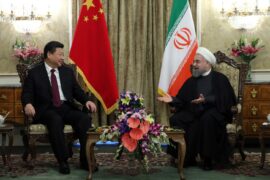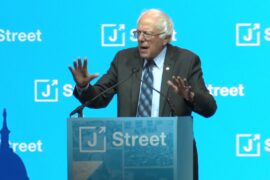US officials announced Wednesday that they’ve “helped” Israel and Hamas to reach a ceasefire and hostage deal.
Israelis are divided on the deal and protests have broken out for and against it throughout the country.
While virtually all Israelis are eager to bring the hostages home from over 15 months of Hamas captivity, many are concerned over the potential dangers of a deal that would in its first phase see the release of roughly 1,000 Palestinian security prisoners in exchange for 33 Israeli hostages, as well as the partial withdrawal of Israeli forces from key parts of the Gaza region.
The deal, which had been aggressively pushed by US President-elect Donald Trump and his emissary Steve Witkoff, gave Prime Minister Binyamin Netanyahu (Likud) and the Israeli public an ominous taste of what should be expected over the next four years.
Trump just forced Netanyahu to accept an agreement that is almost identical to a deal the prime minister refused to accept in July 2024 – a deal he insisted it would irreparably harm Israel’s security.
Outgoing Secretary of State Antony Blinken revealed at the Atlantic Council in Washington on Tuesday that the Fatah-led Palestinian Authority would ultimately run Gaza according to the agreement.
“Israelis must abandon the myth that they can carry out de facto annexation without cost and consequence to Israel’s democracy, to its standing, and to its security,” Blinken said.
One of Washington’s primary concerns throughout this war has been that Israel would return to directly controlling Gaza and would ultimately rebuild the Jewish communities destroyed as part of the 2005 Gaza Disengagement.
The idea of a return to Gaza has gained popularity within certain sectors of Israeli society over the last year and the Biden’s administration has appeared powerless to ensure that this wouldn’t actually take place. But now that Donald Trump is days away from being sworn in, the president-elect has fully thrown himself into the American efforts to push Israel out of Gaza.
Steve Witkoff, a Florida real estate billionaire close to Trump who’s been working with Biden administration envoy Brett McGurk to achieve the agreement, came at Prime Minister Netanyahu like a bulldozer. According to a report in the Haaretz newspaper, Witkoff even forced Netanyahu to leave his family lunch and meet the US envoy on Shabbat in order to advance the deal.
The message was clear. Trump isn’t playing games and won’t tolerate any of Netanyahu’s “tricks” this time around.
In an interview with Israeli journalist Barak Ravid following his first term, Trump castigated Netanyahu for blocking his efforts to divide the land of Israel. Trump told Ravid that he believed Netanyahu “did not want to make peace. Never did.”
While the vast majority of Israeli society and most pro-Israel Diaspora Jews bought into the fantasy that a second Trump presidency would benefit the State of Israel, what’s already become clear is that Jerusalem would have likely had an easier time maneuvering the new geopolitical reality had Vice President Kamala Harris won the election in November.
Following Israel’s uncanny achievements in this war and its emergence as the regional power in West Asia, Trump appears eager to cut Netanyahu down to size.
While it’s true that Trump’s tone towards Israel has been friendlier than that of Harris or President Biden, such rhetoric is often irrelevant when it comes to actual policy.
Since the 1967 Six Day War, it has been consistent bipartisan US foreign policy to force Israel to surrender the lands won in that war. The first Trump administration showed no deviation from this pattern. Trump attempted to force a two-state “Deal of the Century” on Israel and only failed because he was outmaneuvered by Prime Minister Netanyahu at the time.
So despite Trump’s likely genuine warm feelings towards Israel (based on a perception of Israel as an outpost of American power), he’s coming back into office with an axe to grind with Netanyahu and a sense that Israel owes him something for all the friendly gestures he made to Jerusalem prior to the unveiling of his two-state plan.
During the last 15 months of war, Netanyahu defied the Biden administration at almost every point. Washington’s attempts to tie Israel’s hands for the most part failed. This was partially made possible by the fact that most Israelis perceived Biden and his team as somewhat hostile, coupled with a perception of Biden being weak.
Prime Minister Netanyahu actually increased his own domestic popularity by proving himself able to stand up to the Americans on several occasions.
On a deeper level, Netanyahu’s defiance of Washington caused the people of Israel to enjoy significant advancement in our internal development.
The experience of continuously ignoring American demands and then succeeding at our military objective each time showed the nation that we can say no to Uncle Sam and still thrive as a result. Israel actually emerged from this multi-front war as the regional power through this process. And the public caught a glimpse of how strong Israel could be when our leaders behave like heads of an independent state.
Had Harris won the presidential election, this process of furthering Israel’s internal liberation would have likely continued. But Trump is a whole different breed of US president. For starters, his superficial pro-Israel rhetoric caused many Israelis to regress. It’s easy for Israelis and Diaspora Jews to believe that the Democrats are against us while the Republicans are on our side. But the reality is that the United States as a global hegemon struggling to retain its dominance in the world has regional interests in West Asia that are diametrically opposed to Israel’s.
It therefore stands to reason that Jerusalem benefits most from a weak leader in the White House – especially one perceived as overtly hostile to Israel.
Many Israelis on the right, especially those not ready to confront the hard realities of the US-Israel relationship, have put forward the erroneous theory that this deal is something Netanyahu actually desires – that the prime minister wants to withdraw Israeli forces from the Netzarim corridor and the Philadelphi route and to allow the Western-backed Palestinian Authority to ultimately take control of Gaza.
This analysis ignores the fact that Prime Minister Netanyahu had resisted such moves at every turn until now. Israel’s military even expanded its infrastructural presence in Netzarim in anticipation of remaining in the corridor for the foreseeable future.
Netanyahu had also successfully resisted pressure from the Biden administration to talk about a “day after” plan. This is likely because he knows that the only plan for Gaza that could serve Israel’s true interests is one that Washington and its allies could never accept – namely permanent Israeli control.
This is likely not only because Netanyahu understands that Israel needs a military presence in Gaza in order to effectively protect the country’s south but also because he sees the Gaza Disengagement as an injustice that he could envision – under the right geopolitical conditions – correcting through the rebuilding of the Gaza Jewish communities destroyed in 2005.
Prime Minister Netanyahu is more of an ideologue than he lets on. But unlike his predecessor, Prime Minister Yitzḥak Shamir, Netanyahu generally doesn’t have what it takes to confront the Americans head on. He tried a more direct approach during his first term in office and got taught a harsh lesson by President Bill Clinton. Since then, he’s adopted a style of misleading American leaders into thinking he’s on board with their plans – only to quietly sabotage those plans.
This infuriated Trump last time around.
Rightist Israelis should be careful not to place too much blame on Netanyahu for this deal. It’s true that he didn’t stand up to Trump in the same manner that he had been resisting Biden until now. But Trump is coming in hot with a score to settle and is determined to trap and impose his agenda on Netanyahu.
The conclusion those unhappy with this ceasefire and hostage deal should reach is that the US-Israel relationship is deeply abusive and dangerous to Israel’s longterm survival. Netanyahu might not be perfect but, unlike his political rivals, he’s keenly aware of the unhealthy nature of the relationship and has been taking quiet steps to increase Israel’s military and economic independence.
How the prime minister will weather the Trump storm for the next four years remains to be seen but those in the national camp should offer him the necessary support and maneuverability to bring his A-game on Israel’s behalf.






I think it’s misleading to say that this current deal is almost identical to the one Netanyahu rejected in May ’23. Notable difference are the rate of hostage release and the significant Israeli presence in Philadelphi in phase 1.
More importantly, we can see that just as much as Netanyahu is for Trump another tool that can be used to pursue the glorification of the Trump empire, Trump is for Netanyahu a tool that can be used to continue fighting the war (at the soonest opportune time). In the meantime, we get hostages, gain intelligence, and re-assemble in order to go continue the fight, stronger and with more outward US backing. In the meantime, we continue to build our military capacity in order to reach independence from the US.
Seems to me like a tough deal to pass up.
There is a more positive and less foreboding way to view Trump’s intentions for Israel and the Middle East. Trump is a world-class negotiator who leaves his allies and enemies guessing as to his true intentions. Only in retrospect can his intentions be understood by his actual actions.
Look at his actions: Golan Heights; embassy moved to Jerusalem; Abraham Accords; MOU for $38 billion of military aid to Israel; Isis crushed; Iran nearly bankrupted and nuclear deal ended; Hamas, Hezbollah and other Iranian proxies suppressed; Palestinian conflict suppressed, PA funding and support ended, PLO office in DC closed; claims rejected that settlements were illegal and main obstacle to peace; staunch defense of Israel in the UN by Nikki Haley; funding of UNRWA cut; withdrawal from UN Human Rights Council; sided with Israel against the ICC’s investigation of “Israeli war crimes”; and on and on.
If you look past his rhetoric and look only at his actions, could you name a more pro-Israel president in American history than Donald J. Trump?